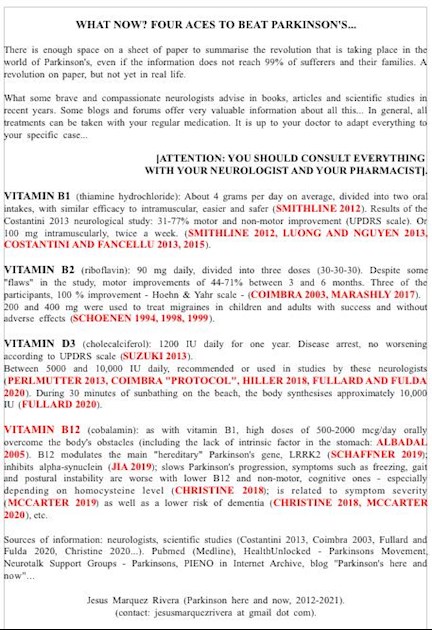There is enough space on a sheet of paper to summarise the revolution that is taking place in the world of Parkinson's, even if the information does not reach 99% of sufferers and their families. A revolution on paper, but not yet in real life.
What some brave and compassionate neurologists advise in books, articles and scientific studies in recent years. Some blogs and forums offer very valuable information about all this... In general, all treatments can be taken with your regular medication. It is up to your doctor to adapt everything to your specific case...
[ATTENTION: YOU SHOULD CONSULT EVERYTHING
WITH YOUR NEUROLOGIST AND YOUR PHARMACIST].
VITAMIN B1 (thiamine hydrochloride): About 4 grams per day on average, divided into two oral intakes, with similar efficacy to intramuscular, easier and safer (SMITHLINE 2012). Results of the Costantini 2013 neurological study: 31-77% motor and non-motor improvement (UPDRS scale). Or 100 mg intramuscularly, twice a week. (SMITHLINE 2012, LUONG AND NGUYEN 2013, COSTANTINI AND FANCELLU 2013, 2015).
VITAMIN B2 (riboflavin): 90 mg daily, divided into three doses (30-30-30). Despite some "flaws" in the study, motor improvements of 44-71% between 3 and 6 months. Three of the participants, 100 % improvement - Hoehn & Yahr scale - (COIMBRA 2003, MARASHLY 2017).
200 and 400 mg were used to treat migraines in children and adults with success and without adverse effects (SCHOENEN 1994, 1998, 1999).
VITAMIN D3 (cholecalciferol): 1200 IU daily for one year. Disease arrest, no worsening according to UPDRS scale (SUZUKI 2013).
Between 5000 and 10,000 IU daily, recommended or used in studies by these neurologists (PERLMUTTER 2013, COIMBRA "PROTOCOL", HILLER 2018, FULLARD AND FULDA 2020). During 30 minutes of sunbathing on the beach, the body synthesises approximately 10,000 IU (FULLARD 2020).
VITAMIN B12 (cobalamin): as with vitamin B1, high doses of 500-2000 mcg/day orally overcome the body's obstacles (including the lack of intrinsic factor in the stomach: ALBADAL 2005). B12 modulates the main "hereditary" Parkinson's gene, LRRK2 (SCHAFFNER 2019); inhibits alpha-synuclein (JIA 2019); slows Parkinson's progression, symptoms such as freezing, gait and postural instability are worse with lower B12 and non-motor, cognitive ones - especially depending on homocysteine level (CHRISTINE 2018); is related to symptom severity (MCCARTER 2019) as well as a lower risk of dementia (CHRISTINE 2018, MCCARTER 2020), etc.
Sources of information: neurologists, scientific studies (Costantini 2013, Coimbra 2003, Fullard and Fulda 2020, Christine 2020...). Pubmed (Medline), HealthUnlocked - Parkinsons Movement, Neurotalk Support Groups - Parkinsons, PIENO in Internet Archive, blog "Parkinson's here and now"...
Jesus Marquez Rivera (Parkinsons here and now, 2012-2021).
(contact: jesusmarquezrivera at gmail dot com).
---
(Epilogue of my next book that will possibly be published on Amazon in March 2021...)

